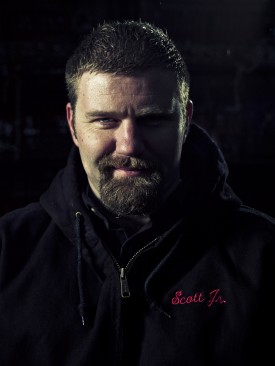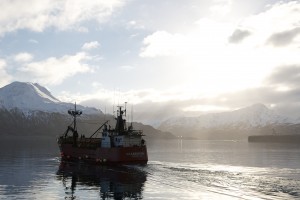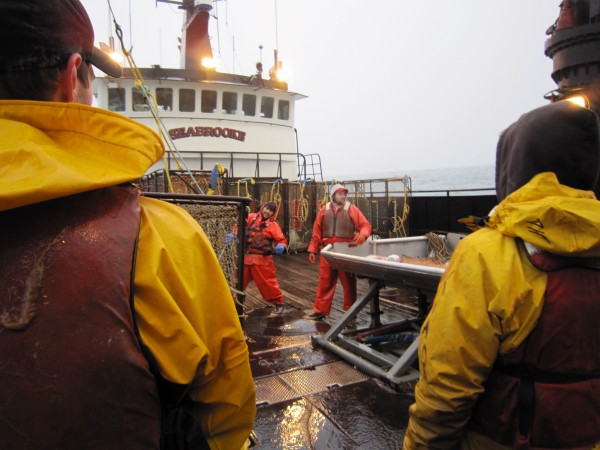‘DEADLIEST CATCH’ INTERVIEW: Captain Scott Campbell Jr. on his greatest fears in the Bering Sea

At 37 years old, Captain Scott Campbell Jr. is the “young” guy on the Bering Sea. But don’t let his age fool you. Campbell’s fishing career extends back many years and runs deep in his blood. He attacks the choppy waters off the coast of Alaska like a seasoned veteran, one willing to take a few risks to pull in a larger catch.
Campbell’s difficulties on the open sea (seemingly biblical in nature) have been the subject of this season’s Deadliest Catch, which continues with new episodes Tuesdays at 9 p.m. on Discovery Channel.
The captain’s presence on the reality series is somewhat surprising because Campbell actually turned down the offer to appear on the show a few times before finally accepting. “(Discovery) approached us a couple different times, and we turned them down, just because … timing-wise it just didn’t work out,” Campbell said recently on a phone interview. “And then this last time when they approached us, we took it a little bit more seriously and took a look at it. And then you had to go down and be interviewed. They basically say, ‘What’s your fishing style? What’s your boat?’ Asked us a variety of questions, and that’s how they make their decision.”
Campbell said he loves being featured on Deadliest Catch because it will provide his children and future grandchildren a chance to appreciate the difficulties he endures at sea. “I’m just a fisherman,” he said. “I’m not into it for the notoriety. I’m into it for the story, to show people the trials and tribulations that we as fishermen go through — the misery, the heartache, the pain.”
But there have been challenges with more men the Seabrooke, the boat he’s captained for several years. “You’ve got a guy that you’ve never worked with before, and he’s on your boat and now you’re responsible for his safety,” Campbell said. “For him to get those good pictures, or get the good shots, basically he’s got to put himself more so in danger than my crew — leaning over the rail to get the shots or be in a position where he’s going to have a wave come and hit him before it hits my crew. There’s a lot of added responsibility having a camera crew on the boat.”
RUNS IN THE FAMILY
Campbell’s father was a crab fisherman, as was his uncles and maternal grandfather. Growing up in a fishing community in Kodiak, Alaska, the lifestyle became “second nature,” or as he put it: “I was born and bred to fish. … A lot of kids grow up and they want to be police officers, firefighters, whatever. I was the kid that wanted to be the fisherman.”
He took to the profession very quickly. In his mid-20s, he found himself running his first boat. “If you’re going to do it, you need to start young, so that by the time you get to my age, you’re a seasoned vet and can make some good decisions and have a big career as a captain. … If you wait too long, you’re only going to be up in the wheelhouse for six or eight years, and then you’re going to be in your late-50s and you’re getting to a point where you need to retire.”

Although he loves his job, Campbell admitted that the challenges can become quite burdensome, almost to the point where calling is quits seems like the logical choice. The greatest test on this season’s Deadliest Catch has been the Seabrooke’s difficult battle with the moving ice in the northern waters.
“This year mentally broke me,” he said. “It was the first time I’ve ever been to the point where I was second-guessing myself being up there. Because the ice was so bad this year, and it was so relentless and it would not give up. Normally we see ice where you’ve had it for a couple of weeks and then it’ll go away, and you might have it one or two times after that. We had five months of ice. It was just the most frustrating season I’ve ever had, because there was nothing I could do. I couldn’t get around the ice. I couldn’t get away from the ice. I had to deal with it, fish through it. Yeah, there was a lot of times this season where I started thinking, why am I up here? Is this really worth it? Is this danger level worth me being up here and being away from my family? This year was the year that really put me to the test.”
When his vessel gets stuck in the ice, Campbell said he has a “sense of panic” running through his mind. Many questions begin to surface and he needs to answer each one right away, otherwise disaster is imminent “It’s the worst nightmare that any fisherman can be in,” he said of the ice. “What keeps you on edge, keeps you safe. Anybody that’s cocky and confident and goes up there and says they’re not scared — one, they’re either an idiot, or two, they’re lying. When I kiss my kids goodbye, in the back of my mind … I don’t know if that’s the last time I’m going to see them or not. But it’s in my blood. It’s what I do. I have firefighters come up to me and say, ‘Man, you’re one of the craziest guys I know.’ You know what? There is no way I would ever go into a burning building. To me, they’re crazier than I am. But it’s our job. They have a passion for what they do. I have a passion for what I do.”
Any good captain needs to rely on a well-trained crew that can adapt to any situation on the high seas. Campbell said he looks for loyalty among the men that call the Seabrooke home for up to 180 days a year. “I understand that certain guys are quicker, certain guys are stronger, but as long as I know they’re giving me 100 percent, I’ll give them 100 percent in return,” he said. “That’s what I look for in a crew member: loyalty and somebody that’s willing to give me their all, no matter what it is.”

One would think that when Campbell and the crew are back on land, they would keep their experiences a distant memory until it was time to return to the Bering. But sometimes the call of the ocean is too powerful to ignore. “If you’re a true fisherman, when you’re at home, you’re going to get stir crazy,” the captain said. “You’re going to want to have that thrill and excitement of going out there and competing against other fishermen. That gets all of us. It doesn’t matter. Sometimes you never know when it’s going to come. Sometimes it comes three weeks after being home. Sometimes it’s a couple of months after being home. But you have that desire to get back in that competitive mode and get out there and start fishing again. It’s the nature of a fisherman.”
RAW TELEVISION
Deadliest Catch, which has been the hallmark of Discovery Channel for several years now, continues to bring in millions of viewers on a weekly basis. Campbell said the success of the reality series has largely to do with the rawness of fishing and the fact that the show is truly “reality” television.
“There’s no elements that can be added, because you’re out in the middle of the Bering Sea,” he said. “It’s not like when a big wave comes and hits the side of the boat, you get to say, ‘Oh wait, can we redo that?’ It is what it is. … When you have a big wave come over and it damn near kills you, your reaction is your natural reaction.”
Humility, usually in short supply for reality television stars, is something that Campbell prides himself on. The captain said he realizes there are limitations to his experience, but knowing them is the first step to overcoming them.
“Yeah, I am a younger captain in the fleet,” he said. “I still have a lot to prove. There’s still a lot of things I don’t know. Every time I go up for a new season, I learn something new. I’ve always told myself, ‘The day that I don’t learn anything new is the day that I probably shouldn’t be up there fishing.’ You’ve got to have an open mind. Every year is different. It’s a learning gig, and I’ve got to learn.”
By John Soltes / Publisher / John@HollywoodSoapbox.com
-
Deadliest Catch airs Tuesdays at 9 p.m. on Discovery Channel. Click here for more information.


Why isn’t Scott Campbell Jr and the Seabrook on the deadliest catch this season ????